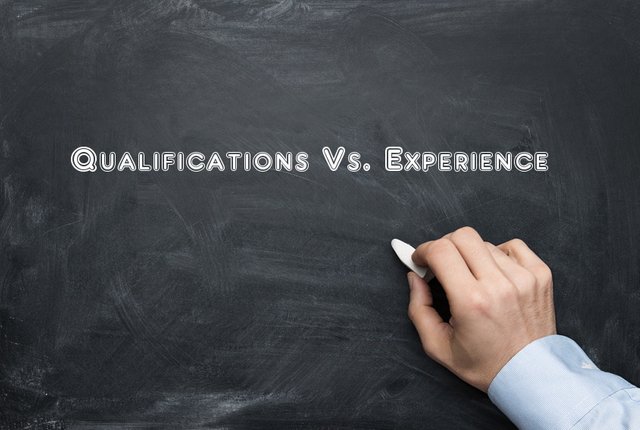Experience or Qualification: What’s More Valuable?
This age-old question has almost as many answers as there are people on the face of this planet. You will hear people belonging to one camp or the other fervently debating this question. Normally, which side one takes in this debate is largely dependent on that person’s profession or sector or field of work. For example, someone working in academics or the education sector will probably consider qualification to be much more important than experience. On the other hand, someone working in the industry is more likely to prefer experience over qualification.
Of course, a number of other factors are at play here. The increase in the number of universities around the world has prompted a large number of people to believe that the only way to get ahead is with a university degree. Then there are those who consider formal education, and especially higher education, to be overrated. This segment believes that university graduates entering the workforce are highly disconnected from and unprepared for the workplace. They are not well-equipped to meet the demands of professional life. As a result, a lot of time is spent in learning and getting used to things in the workplace. Of course, there is also the case that many aren’t quite able to afford quality higher education these days with its ever-rising costs and the mountain of student loans that keeps getting bigger and bigger.
Be that as it may, we do not feel that this is one of those either/or debates. While professionals on both sides of the argument may be taking sides fervently, one thing cannot be completely dismissed in favor of the other. That being said, there are compelling arguments made by proponents from both camps in favor of their views. Let’s take a look at both sides of this argument one by one.
Qualification Matters More
If you ask any university lecturer or professor or staff member, they would say without hesitation that your qualifications matter a lot more than your experiences. Firstly, they would say that your degree reveals a lot more than just your academic ability. This so-called “piece of paper” is not merely for the purpose of getting a “job” or starting a “career.” Particularly with regard to the workplace, academic professionals argue that most job descriptions these days are written with a particular and specialized degree in mind. Therefore, the market has categorized jobs on the basis of degree requirements. This is a clear indication that the job market has a high regard for individuals holding specialized degrees.
Furthermore, being educated provides greater opportunities for personal as well as professional development. Not that an experienced individual not having higher education cannot grow and develop as a professional. But an educated individual can do so faster and with greater depth. Besides, the strong industry-academia linkages that are in place nowadays provide a thorough grounding in both the theoretical and technical aspects of a subject, thus enabling young graduates entering the market to secure good jobs without much hassle. The general trend proves that if you want to go far in your career and achieve great things, you are more likely to do so with a university degree in hand.
Now, let’s get some views from the other side.
Experience Matters More
On the other hand, you’ve got professionals working in various sectors and industries who believe that an experienced individual not possessing a degree is a more valuable resource than a fresh graduate entering the scene who is not quite sure what the workplace requires or expects of him.
The arguments put forward by this group in favor of their assertions certainly have some merit too. With regard to degrees, they argue that since more people than ever before are now attending universities and getting degrees, there is a sort of saturation of degree-holding graduates in the market. In such a scenario, you need to have something that sets you apart from the rest. And your degree won’t do that for you (unless you were a gold medalist or honors student in university). Therefore, having experience can really help you in getting the nod over other eager and fresh-faced job applicants who have nothing else to offer except their fancy degrees.
Hypothetically speaking, it does seem like a better idea to be a young professional in your early 20s with a few years of experience already under your belt. Because at the other end what you have is an eager young graduate who might be full of enthusiasm and drive but doesn’t really know what the workplace expects or demands from him/her and will need time to adapt and learn the ropes. This is precisely the reason why a lot of employers are likely to prefer experience over qualifications.
As mentioned earlier, this debate is not an issue. People may take sides, but good balance between the two is needed. Yes, we know it is hard for fresh graduates to have that balance. But there are always internships and volunteer causes that can be adopted to gain valuable credit as well as build up some work experience before graduating and heading out into the real world. A good amalgam of theoretical knowledge and practical exposure will definitely put an individual in good stead and give him/her a better chance of doing well professionally.




Beautiful .. Creativity
Well done, the most valuable is that you know how to use what you have
Thanks for sharing
Qualifications are just only for formality but when you are in the actual job, experience is the best .
Actually, only around 20% or maybe less on what we learn from school that can be use in the actual job. Please dont get me wrong, education is important but what I am pointing out is that experience counts better than of qualification. Sometimes qualification is just a piece of paper :)
I consider that education should be more focused in the inclusion of experience along the learning journey instead of just keeping knowledge theoretical in the class room. That way it would be the best of both worlds and you would feel much better about studying qualification while also gaining experience. Sadly most universities are in just for the money. At the end, education is a business itself.
But shouldn't education be focused primarily on teaching for the sake of intellectualism not so that one may work?
Yes education may be a business, but for a business to be successful they must provide the best services possible. Some universities (Including mine) actually already offer inclusion of experience along the way.
Interested in what you think!
Perhaps experience may be more valuable for work once one has a job. But with education there's an abundance of interesting things one can study, arguable far more valuable for life. They say arts degrees teach students to despise the money they never earn. Haha
Experience is more valuable than qualifactin. But we can not regret the qualification also. both are have value in itself
This post has received a 25.56 % upvote from @booster thanks to: @jansher.
To listen to the audio version of this article click on the play image.

Brought to you by @tts. If you find it useful please consider upvote this reply.
Your writings are very impressive😊...
You got a 3.02% upvote from @postpromoter courtesy of @jansher!
Want to promote your posts too? Check out the Steem Bot Tracker website for more info. If you would like to support the development of @postpromoter and the bot tracker please vote for @yabapmatt for witness!
Some form of education is necessary in the particular field of choice but experience is definitly the best teacher . The experience one gains from time and exposure in a particular field can never be acquired in an educational institution